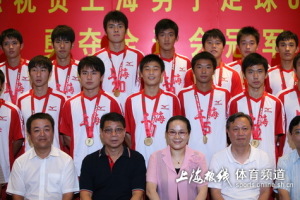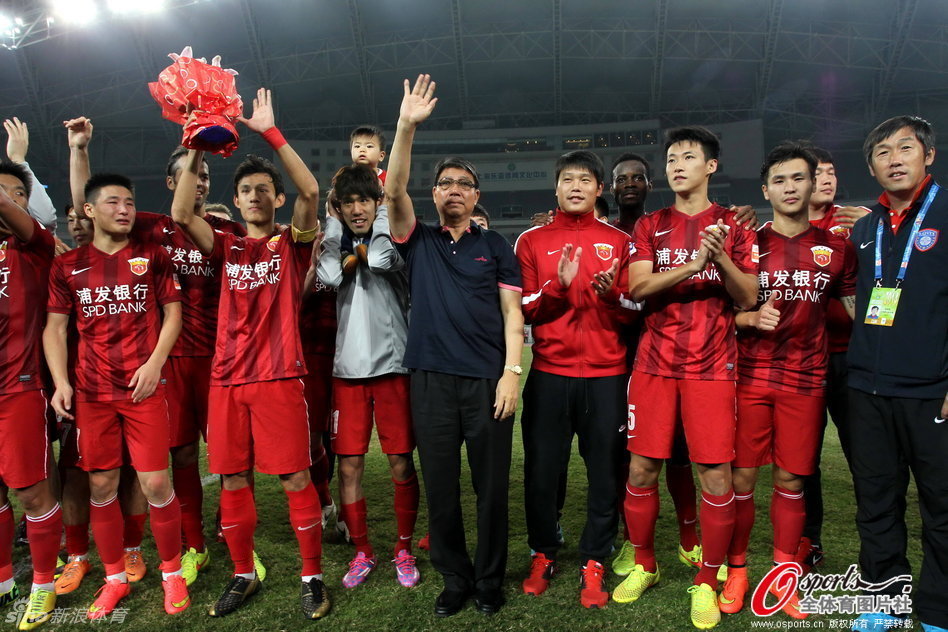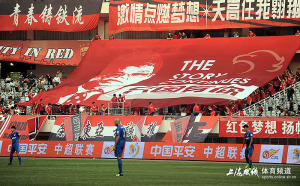As the penultimate match of a thoroughly satisfying season drew to a close on Sunday afternoon, a palpable sense of a genuine watershed moment loomed over Shanghai Stadium.
A changing of the guard
This year, Shanghai East Asia have firmly established themselves as the top team along the Yangtze River Delta – standing 10 points ahead of visitors Jiangsu Sainty going into the final weekend, and with an enviable record against each of their local rivals. East Asia rose to the challenges presented by Shanghai Shenhua (1-1 home and away), Shenxin (5-1 and 3-1 wins) and Hangzhou Greentown, (1-1 away and 2-1 home) whilst the aforementioned Jiangsu were the only team in the region to inflict defeat on the reds, thanks to a contentious 1-0 win in Zhejiang back in May. The unpleasant spectre of that match was comprehensively laid to rest here.
But there was much more to this fixture than just local pride and the usual end of season festivities. Thanks to Shanghai International Port Group’s move to acquire a controlling stake in the club, this was to be the last time chairman Xu Genbao would send his team out at Shanghai Stadium. Calls during the week for East Asia’s stay-at-home fans to join in the send-off were clearly heeded, as both tiers of the vast Shanghai Stadium’s East Stand were packed with fans all set to witness this milestone moment in the brief history of their club. Banners and giant tifos were unveiled, whilst a chorus of “Genbao muzi” (Shanghainese for ‘hero’) continued throughout the game and long after the final whistle.
On a night like this, it would have been easy for off-field issues of such magnitude to have overshadowed the events down on the pitch, particularly given East Asia’s underwhelming end to the current campaign. Nonetheless, far from proving a distraction, the events of the day – coupled with a raucous contribution from the East Stand – set the stage for an inspired home performance; a hark back to their early-season dominance at home.
A fitting send-off
Jiangsu began well, although they would ultimately come to rue the inviting early chances spurned by Deng Zhuoxiang and Edison Toloza inside the first quarter of an hour. Shanghai eased themselves into the game, and found themselves in front on the half hour mark, thanks to an incisive break which ended in an unmarked Wang Shenchao easily converting Zhu Zhengrong’s cross at the back post. The captain ushered a team salute in the direction of the chairman in celebration, and from there the home side began to impose themselves on their visitors.
East Asia largely controlled the second half, although it wasn’t until the 80th minute that they finally doubled their lead. Again the home side attacked down the left flank; this time Zhang Wei crossed for Wu Lei, who finished with an excellent diving header.
Shanghai’s third and final goal, however, was much more down to some utterly comical defending than any moment of individual brilliance. It began with Jiangsu goalkeeper, Guan Zhen, running 35 yards away from his goal in an attempt to meet a chipped ball intended for Wu. Having taken out teammate Shin-Young Yoon in the ensuing encounter, Guan scrambled frantically back and neither he, Liu Jianye or Li Ang could prevent Tobias Hysén rounding off proceedings with yet another headed goal from Wu’s resulting cross.
And so, at 3-0, the game ended – and with it, the 2014 CSL season at Shanghai Stadium. Few fans can look back on the season with too many complaints; securing a Champions League spot in only their second year in the top flight was always going to be a big ask, but the club can look forward to next year having made considerable progress in 2014.
Where next?
Indeed, the chief concern for the club and its fans now, is where the money that has been promised as part of the SIPG takeover of the club is going. Reports this week suggested 18-goal top scorer Hysén could be set for a move back to previous club IFK Göteborg, with the player admitting in an interview with the Swedish GT Sports channel that he was homesick. The player stated that he was unsure where his future lay, despite having another year to run on his contract, but it remains to be seen how the new owners, and indeed the new management team (a possible link up with a fellow countryman, perhaps?) intend on addressing the issue.

Xu Genbao with East Asia Regulars Lv Wenjun, Yan Junling, Cai Huikang, Wang Shenchao, Wu Lei and Wang Jiayu following Shanghai’s 2009 National Youth Games win.
It also remains to be seen how the changes will impact on fellow foreign players, Daniel McBreen, Iban Cuadrado and Ransford Addo. Even recent signing Imad Khalili may be questioning his future at the club, having failed to really make his mark since his summer arrival. Nevertheless, regardless of whoever stays or goes, the future of the club looks bright, as Xu Genbao’s legacy lives on via the next batch of graduates from the established academy in Chongming Island. If this conveyor belt of domestic talent can be complemented by some even greater overseas experience in key areas, East Asia can be confident of challenging more consistently for the Champions League next year.
This Sunday’s trip to Tinajin TEDA may be Xu’s last as acting chairman and head coach, and his influence will clearly be missed, with numerous players and fans in tears at full time last weekend. Having grown up together under his tutelage at his own academy, into a side competing at the top end of the CSL, this East Asia squad will face a new challenge adjusting to life without the man who founded the club back in 2006. So too the fans; a section of whom have submitted a number of demands to the new owners – chief among them, the colour and badge of the club remaining as it currently is, while also significantly, that Xu Genbao be given an honourary role of some sort within the club.
So whilst uncertainty lingers over Shanghai East Asia as the season draws to a close, the potential is there for an exciting new chapter in the club’s history. One thing that is for certain, however, is that none of this would have been possible were it not for considerable efforts of Xu Genbao.

